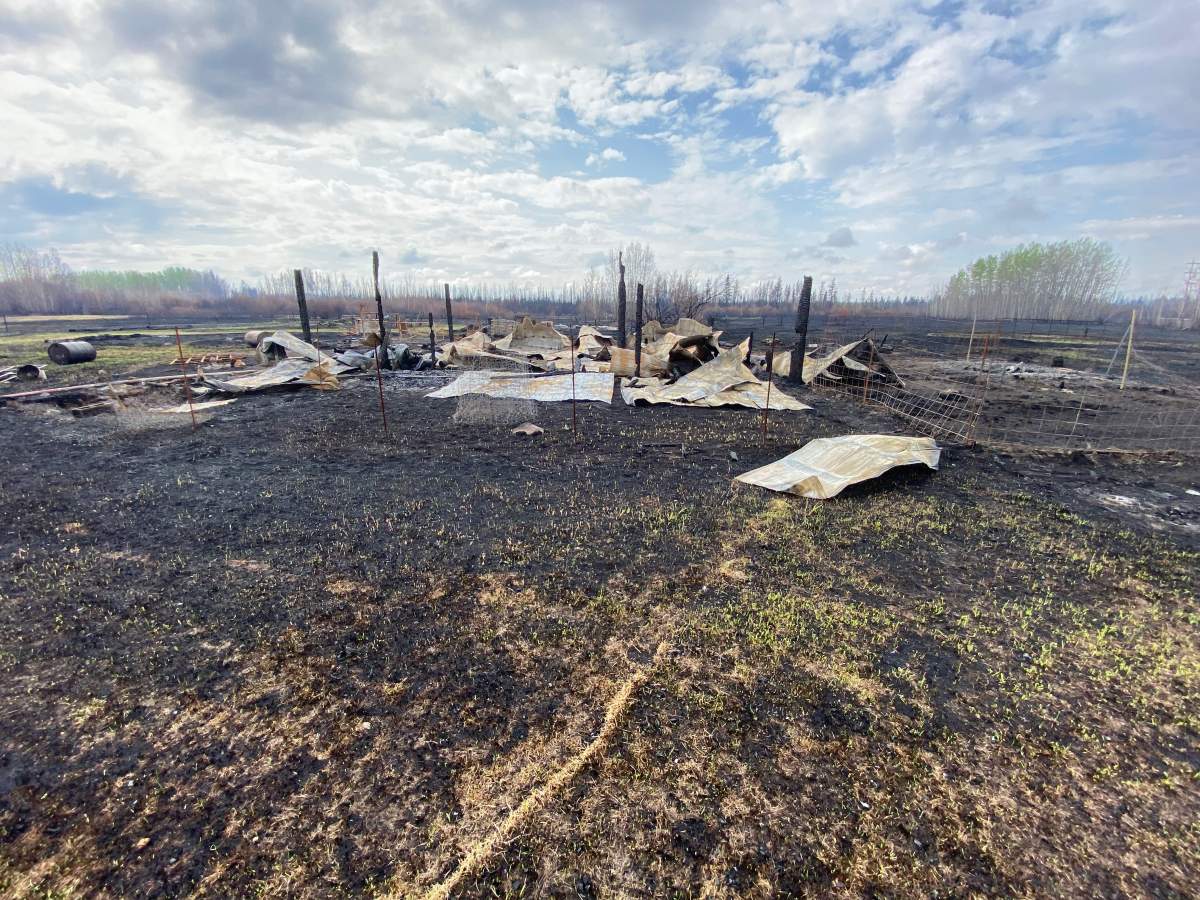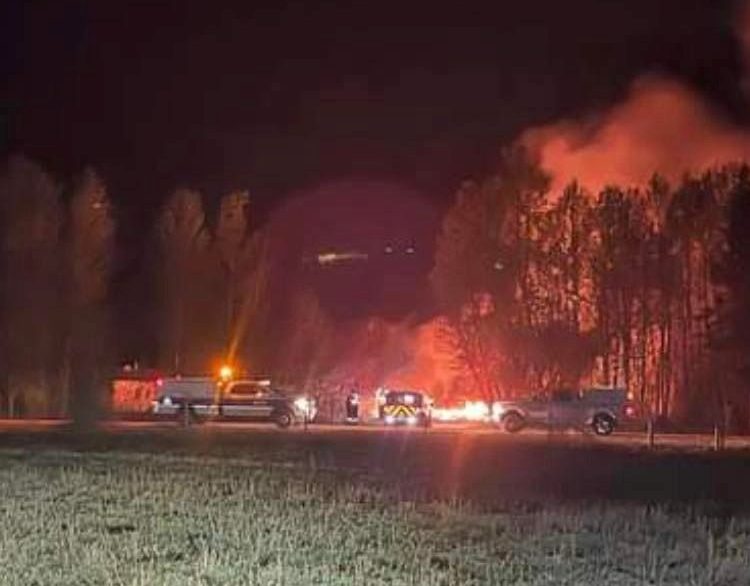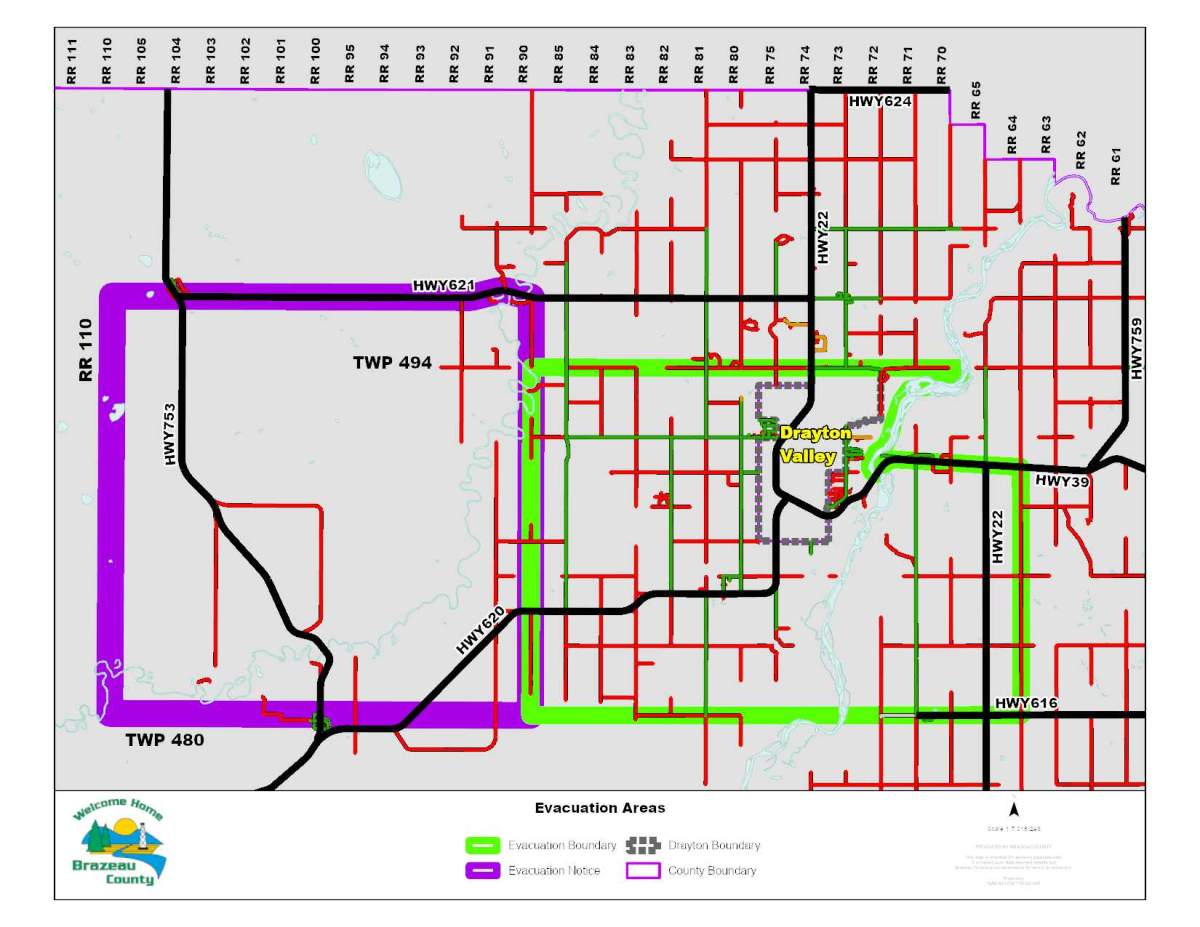Wildfire season has devastated Alberta early and dramatically.

Wednesday, May 10 marked the second week of a volatile wildfire situation, with 85 wildfires burning across the province, 23 of which were listed as out of control.
An estimated 405,908 hectares has burned or is burning so far this season.
“For context, that’s about double the entire area burned for the entire wildfire season and it’s only May 10,” said Christie Tucker, unit information manager with Alberta Wildfire, on Wednesday afternoon.

The premier declared a state of emergency on Saturday, and there are 20 states of local emergency, four band council resolutions and 13 evacuation orders in place, said Colin Blair with the Alberta Emergency Management Agency on Wednesday.
That means the demand for firefighting resources — as well as communication — is extremely high.
“It certainly makes it more complex,” said Matthew Lemon, a disaster and emergency management instructor at NAIT.
“You’ve got more stakeholders involved … ensuring you’re having consistent messaging.”

“It’s a little more difficult in the smaller municipalities. There’s just not as many resources. They likely will be more linked in the provincial operations centre, relying on some of those resources.”
Lemon, who was part of the 2013 Alberta floods evacuation, said emergency operations staff will be feeling the stress.
“It’s very busy. They’re all very trained for this. It’s going to be very coordinated. They have plans for this.”
Managing a crisis like this can also be stressful for more personal reasons, he said.
“They are community members as well, so they’re also impacted or friends and families are potentially impacted.”

Several local fire chiefs have spoken out about how worn out their firefighters are.
“The firefighters in Yellowhead County? Very resilient. Very tired. Very, very tired,” said Albert Bahri, Yellowhead County fire chief, on Monday. “They’re evacuated. We’re losing homes. It’s tough.
“We had a firefighter — structures in his property burned down. He was fighting the fire on the other side of the fire when the fire came from Parkland (County) and went right through his property.”
On Tuesday, Bahri said the county has never seen this much fire.
“Look at the size of the fire and the time that it moved. It was unbelievable. It’s unprecedented in the county.
“The concern that I have is more new starts. The rain hasn’t completely blanketed Yellowhead County.
“It’s 22,000 square kilometres. It’s a big county. If you compare that to some cities, you can fit New York in there probably 15 times. It’s big.”

According to the county’s website, the Yellowhead County Fire Department has 11 full-time and 80 paid on-call/casual firefighters.

Get daily National news
They serve Yellowhead County and parts of Parkland County with mutual aid agreements with the Town of Hinton and the Town of Edson.
“We have to make sure we can jump on the new starts — Ag and Forestry jumps on those — we look at the stuff we can get to very quickly,” Bahri said.
“That’s what we’re planning for, as well as the fires we still have burning.”
When it comes to firefighting resources, he said they’re “maxed out.”
“The resources we asked for, we’ve been provided with. We haven’t asked for extra resources because we understand the rest of the province is burning as well. We don’t want to take all of them,” Bahri said.
“Our fire crews have been at this for over 10 days. A lot of them are beat.”

In its daily update Tuesday afternoon, the province said Alberta currently has more than 700 wildland firefighters, heavy equipment and airtankers responding.
It said help has come from counterpart wildfire agencies in British Columbia, Quebec and Ontario, and Alberta has requested additional resources through the Canadian Interagency Forest Fire Centre in Winnipeg.
The province said more wildland firefighters were arriving later Tuesday from New Brunswick (21 personnel), Yukon (21 personnel), Oregon (23 personnel) and Alaska (22 personnel).
“We’re exhausted,” said Brian Cornforth, fire chief of Parkland County, on Tuesday.
“Crews are at the max. We’re going to have to time out some of those crews.
“We’re looking for new resources. We’re hoping the province steps up and looks at more than the last cache of people they brought in. We won’t see any of those folks,” Cornforth said.
“We need higher level of resources put into the provincial system, otherwise we’re not going to get this fire out. We’re reaching out through our elected officials up into the province to get them to give us some support on the ground.”

Bahri even acknowledged the work of residents who, despite an evacuation order in Yellowhead County, decided to stay and protect their property and their neighbours’ homes.
“We’ve had so many people out there helping. It’s been spectacular. They didn’t leave. Yes, it’s against the evacuation order. We brought them up to speed (about what would happen) if we couldn’t get to them (and) they made the choice to stay and they did a great job.”
South of Yellowhead County is Brazeau County, in which the Town of Drayton Valley is located. Tracey MacDonald and her family have lived on a farm south of the town, near the North Saskwatchewan River, for 13 years.
“We’ve lost our entire farm, our livestock,” she told Global News on Wednesday.
They’ve chosen to stay, despite the evacuation order, because the help is coming from community members or, as MacDonald calls them, “regular people.”
“Eventually we’re going to rebuild. We’re not going anywhere. We’re just trying to contain (the fire) as much as we can and protect the other people’s property.”
She said fire crews tried to save her home for two days before it went up in flames.
“There was no fire department that came for that. I know they were busy with wildfires all across. Neighbours over there lost houses as well,” she said, adding she doesn’t know if more could have been done.
“I can’t judge. I’m not a firefighter. I don’t know what they deal with.”
MacDonald lost dozens of chickens and pigs. Now she’s worried about the hotter temperatures and wind returning and she wants more answers from officials.
“I’m still in shock. Just waiting. Hurry up and wait. We don’t know what comes next,” she said.
“We just didn’t expect it at all,” she said through tears. “It’s hard to look at.”

Alberta Wildfire officials said Wednesday that “preparations are underway to look at re-entry” in Drayton Valley but that won’t happen until it’s safe.
Fire Chief Tom Thomson said the 5,000-hectare fire is still out of control. The evacuation order remains in place.
“We’re worried about the weather that’s coming up in the next couple of days. It’s going to be hot and sunny and windy again.
“We don’t have a definite timeline for people to come back.”
Agencies, such as Alberta Health Services and utility providers, are doing assessments on critical infrastructure, Thomson said.
“It’s been a long, long, hard road for the local fire service. We started this last Wednesday and we’re still hard at it,” he said Wednesday.
“We are now getting a lot of mutual aid support and because of that, I’m now able to provide my staff with some relief. They are able to go and see their families and have some down time before they come back and start battling the fire again,” Thomson said.
“I’m very confident in the team and the crew we have here but everyone is nervous, including our experts.”
He also addressed the resources issue and concerns in the community about fire equipment not being used. The fire chief said the tactical approach to fighting the fire has changed and because of that, different resources are required.
“Water trucks spraying on grass,” for instance, “isn’t effective,” he said. “We’re beyond that stage. We need firefighters in the brush digging up ground.”
Thomson encouraged anyone with firefighting equipment or resources to put their name on the provincial emergency support list by emailing contact information and details to emergencysupportoffers@gov.ab.ca.
“The whole province has a fire problem,” he said.

Residents are being told to expect a more detailed update on Friday.
- Attack on Iran triggers global flight disruptions, impacts Canadian travellers
- WWE Hall of Fame ring belonging to wrestling legend recovered after stolen
- Carney calls for protection of civilians as U.S., Israel strike Iran
- Quebec politician praised for speaking openly about menopause symptom in legislature











Comments
Want to discuss? Please read our Commenting Policy first.